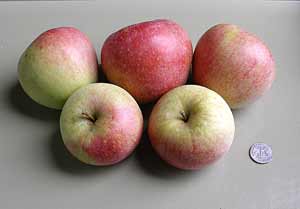Allergic is a state of having an allergy, to a food, to pollen or spores, or to any of a number of things in the atmosphere, ingested or touched. Like families, the more you are exposed, the worse it gets (my family excepted). For comments about food allergies, please see the section on allergies on the home page.
Whilst this site does all it can to list reasonably accurate ingredients for dishes, this is simply as a guide to what flavours you might encounter. It is impossible to know whether a particular chef will decided to use peanut or groundnut oil for frying, or to dress a salad with mustard, or to use fish sauce, based on shellfish, to add a certain je ne sais quoi to a savoury dish. See the 'Allergies' section on the home page formore details.

The alligator is a large reptile, the meat of which is eaten in both South America and North America and along the Yangtze in China. The tail yields two types of meat: a tender, white, veal-like meat and dark tough meat only suitable for braising. Pinkish meat is produced in the body, tougher and of a stronger flavour than the pale tail meat. In 1969 I travelled south following the migration of the snow geese down the East Seaboard of the United States with two friends. We arrived in Louisiana, somewhere near Des Allemands, and could find no firm land on which to pitch our tent. We finally asked at a police station, and they kindly offered their back yard to us. They showed us where to put up the tent, and let us use their primitive, but extremely welcome shower, which consisted of a tin box with a plug in the bottom, held aloft. Once under it, you simply gave a short tug on the plug, which flew out and you were instantly deluged in water. But that was it. Anyway, we then bedded down for the night. In the morning I woke first, as usually happened, and unzipped the tent flap. Outside was an 11 foot (335 cm) alligator, and a row of policemen laughing their heads off. This particular beast came to the back of the police station each morning, where they flung him something for a snack. I don't think they had flinging me to him in mind, but it did feel like it for a moment. Sergeant Red Cowling taught us to shoot his gun and told us all about the different bullets, some for penetrating cars and such like. We ate alligator that night.

A mid to late-season variety of dual-purpose apple with creamy, white flesh. There are records of it before 1884 and it was raised by Thomas Laxton in Lincolnshire as a cross between Cox's Orange Pippin and King of the Pippins. Its first name was South Lincoln Pippin but it was renamed in 1896. It was awarded the Royal Horticultural Society First Class Certificate in 1894 under the name of Brown's South Lincoln Beauty. It ripens from sharp flavoured with good cooking qualities in November and is a late-season apple picked from early October in South-East England, is stored and is at its best from November to December.
Alose. Allis shad. A freshwater shad, from a family of white, migratory fish. The shad is a bony, tasty, oily fish similar to herring, which travels up rivers in spring and is found in deep lakes. In France it is found in the Gironde where it is often grilled over vine shoots or stuffed with sorrel, and in the Loire, where it may be stuffed with beurre blanc. The roe is a great delicacy and shad is also used raw in sushi. Members of the family include Allis shad (Alosa alosa) and the smaller twaite shad or gizzard shad (Alosa fallax).